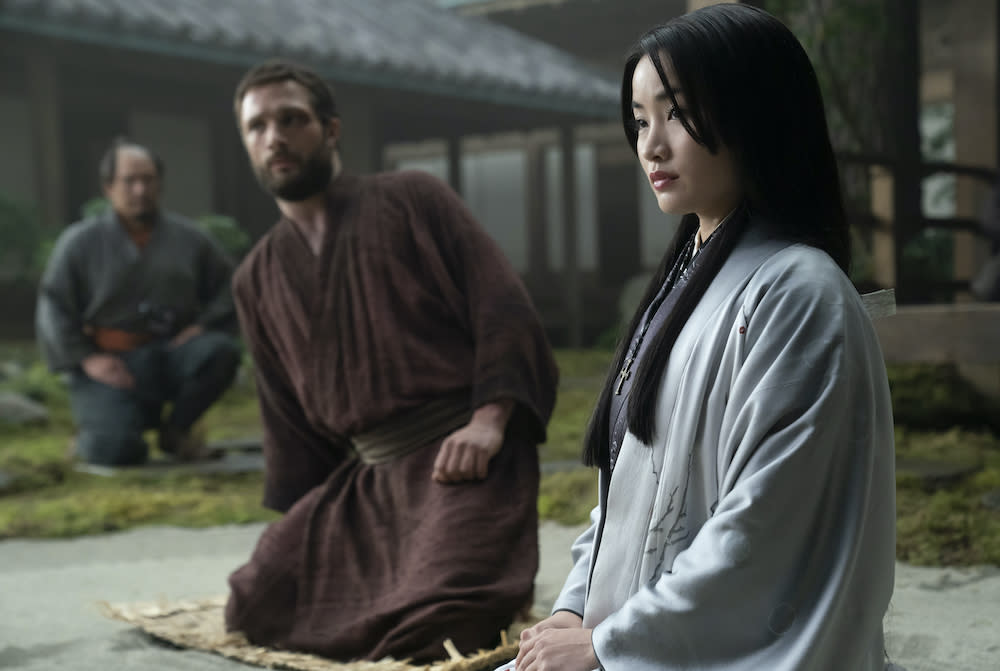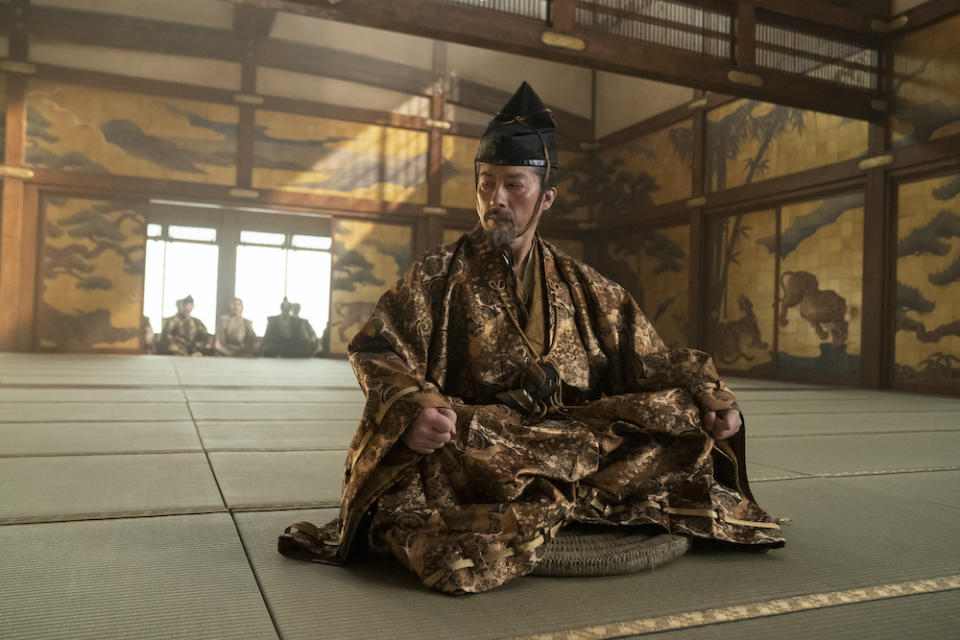‘Shogun’ Is an Old-School Epic with Dazzling New Vision


Nearly midway through FX’s 10-episode epic, “Shōgun,” the marooned “anjin” (aka pilot) John Blackthorne (Cosmo Jarvis) has grown irritated, once again, with the customs of his Japanese hosts. Speaking to his assigned interpreter, Mariko (Anna Sawai), the anjin (as he’s most often referred) can’t understand why his tendered consort won’t express herself; why a grieving mother and widow is so eager to serve his needs, when he claims to need nothing at all. She suffers, but “you’d never know it to look at her,” he says. “Do you know the eightfold fence?” Mariko asks him in reply. “From the time we are small, it is something we are taught to build within ourselves: an impenetrable wall behind which we can retreat whenever we need. […] Do not be fooled by our politeness, our bows, our maze of rituals. Beneath it all, we could be a great distance away. Safe, and alone.”
A maze isn’t the worst way to describe one’s initial impression of “Shōgun.” Co-creators Justin Marks and Rachel Kondo toss viewers into a political power struggle told in two languages, by dozens of characters, and through many a misunderstanding rooted in 400-year-old cultural differences. Wars are waged over everything from religious crusades to plain ol’ petty avarice, and every “busho” (warlord) tends to be tugging a different string with each of their dexterous fingers. Getting to know who’s loyal to whom, what, and why can feel overwhelming, but in time, the intricate scheming becomes one of “Shōgun’s” greatest strengths — second only to your genuine loyalty toward any (or all) of its half-dozen leads.
More from IndieWire
In Live-Action 'The Last Airbender,' Look for Character Clues in the Fight Choreography
Richard Lewis, Comedian and Beloved 'Curb Your Enthusiasm' Star, Dies at 76
“Shōgun” is equally dedicated to crafting an immersive labyrinth of world-turning action and getting to know its sprawling ensemble beyond their blades, guns, and cannons. John Blackthorne may be American audiences’ access point to feudal Japan circa 1600, but the series is savvy about how and when we peek over the eightfold fence protecting Mariko and her fellow builders. Soon enough, you’re on the inside, transported to a time, place, and point-of-view so thoroughly realized you wouldn’t dream of leaving.
Until the beheadings, at least — of which, there are quite a few.
“Shōgun’s” Japan is one ravaged by 100 years of civil wars, where land and laws have shifted back and forth based on what clan controls them. The recent death of the country’s “taiko” (the supreme leader) threatens to shatter a tenuous peace, since his heir is just a boy. Until he comes of age, the Council of Regents is in charge, but despite being hand-selected by the dying leader, the group of five is quickly corrupted.
Save for one member: Yoshii Toranaga (Hiroyuki Sanada) claims to only want what’s best for Japan and repeatedly denies accusations that his lionized battlefield experience and brilliant strategic mind make him a prime candidate to become “shōgun,” an all-powerful military ruler. Instead, he aims to protect his late lord’s successor from those more overtly seeking to replace him. Namely, Lord Ishido (Takehiro Hira), a warlord who rose from nothing and abhors anyone who thinks they’re above him now (or, more accurately, anyone who he thinks believes they’re above him now).
Stoking their simmering schism is the arrival of a British ship, captained by John Blackthorne — once one of 500 strong sailors and now, well, a man who’s seen better days. Decimated by the English’s own war with Portugal and Spain (plus extreme malnourishment from too many lean years at sea), the Erasmus lands in Toranaga’s territory with only a dozen survivors. The Japanese consider them barbarians. The local Portuguese merchants — who control trade with Japan — see them as a threat to their thriving business. The Catholic priests (aligned with the merchants) feel similarly, which means just about everyone would be happy if the ailing anjin and his crew succumbed to their expected deaths.

Everyone, that is, but Toranaga. The shrewd leader sees the crass interloper as an agent of chaos — an opportunity to learn about a foreign land’s nautical tactics and a shiny object to distract his enemies while Toranaga executes his pressing plans. So he brings the anjin under his wing, assigning Mariko to serve as John’s interpreter, albeit without realizing their shared language may lead to shared affections.
War, romance, East vs. West cultures colliding — these are the elements of an old-school epic, and “Shōgun” serves up a sweeping saga nearly too expansive for 10 hourlong episodes. Marks (who serves as showrunner) and Kondo (an E.P.) prove adept at delivering exposition (without over-relying on John, as the ignorant foreigner, to ask for explanation after explanation) and astute commanders of tone. The series is consistently funny for a period drama with so much material to get through, spreading humor’s affability among lead and supporting characters alike. John gets plenty of pithy insults, while Vasco Rodrigues (Nestor Carbonell) steals a number of early scenes as a shit-talking Portuguese sailor, and Kashigi Yabushige (Tadanobu Asano) wins us over in spite of his traitorous both sides-ism with a nuanced repertoire of appreciable grunts and exclamations. (Among many great performances, Asano may deliver the richest, most satisying turn.)
That “Shōgun” remains thoroughly enjoyable from start to finish doesn’t detract from its moving relationships or transportive spectacle. John and Mariko’s connection isn’t as all-encompassing (for them or us) as other epic love stories, but that choice gains meaning as the episodes play out. So, too, does the lack of massive battle scenes. “Shōgun” is purposefully, dynamically intimate, and its creators are wisely wary of trusting thousands of CGI warriors or fights staged against huge, hollow backdrops to convey the significance of their story. Instead, the action is specific and tactile, whether it’s a race between two massive ships or a swordfight transformed by slick rainfall. And the consequences of each dispute are as absolute as they are gruesome.
“Shōgun’s” overt brutality paired with its cunning betrayals calls to mind “Game of Thrones,” but there’s also an elegance and earnestness to the FX production (premiering exclusively on Hulu) that draws a clear line in the sand between the two blockbuster epics. Where the latter is mercilessly lawless — and nastier for it — “Shōgun” pivots on a code of honor few of its followers dare disobey, making for characters that are far easier to invest in and a narrative that’s far less vexing. You’re invited to see life from an array of perspectives, to argue over which brings about a richer life, and to reevaluate those positions as the story unfolds. Death isn’t a punishment doled out for those too dumb to play the game, but an ending to be chosen in a matter befitting the deceased.
Life, too, isn’t something to be squandered. Many of the characters in “Shōgun” see themselves as loners, either by choice or by fate. John clings to freedom so fiercely he sees friends and family as a burden too great to bear. Mariko is his opposite: so dedicated to her departed father’s memory that her duty deprives her of free will. Toranaga is somewhere in between, a leader whose dedication to his people is pure yet whose wariness of betrayal keeps those closest to him at arm’s length. His position of power also perpetuates a lonely existence, pierced on occassion by his affection for John and Mariko.
“Do not be fooled by our politeness, our bows, our maze of rituals,” Mariko says. “Beneath it all, we could be a great distance away. Safe and alone.” The eightfold fence is a respected way of life in “Shōgun,” but the series also regularly recognizes its isolating nature. Rather than overemphasizing the individuals who wage the shrewdest wars, the series is ultimately about connection as a means for peace — a notable vision then, but especially now.
Grade: A-
“Shōgun” premieres Tuesday, February 27 on Hulu with two episodes. New episodes will be released one-per-week through the finale on April 23.
Best of IndieWire
Sign up for Indiewire's Newsletter. For the latest news, follow us on Facebook, Twitter, and Instagram.
